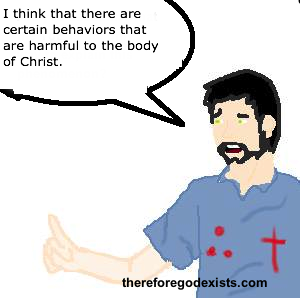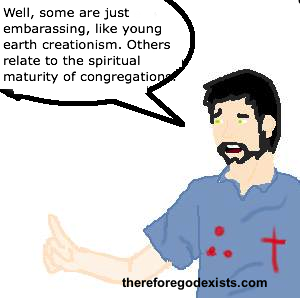 Sometimes we will encounter blog posts from authors who are trying to ‘win the internet’ by pontificating about how conservative Christianity has faltered. They will say that we ought not be so stringent in our beliefs and doctrine, and that Jesus may not have really risen from the dead. They will say that the Bible teaches outdated morals or the church has misunderstood the Bible for the last two thousand years and they are going to relay to us some new interpretation that just happens to be swept away by the cultural tidal waves. They will sternly warn that Christians need to realize that it is acceptable to love Jesus and hate religion, have love for God but not seek after righteousness. When a Christian critiques Christianity or Christian virtues, liberals and atheists will nod in approval of this freethinking and rational Christian who has gone against the grain of biblical belief. They have risen beyond their primitive dogmas and finally realized that the world was right all along. If that is the sort of article that you are looking for, I am afraid that you have come to the wrong place. This is a critique of fundamentalism from a fundamentalist, but it is not a departure from fundamentalist dogma or practice.
Sometimes we will encounter blog posts from authors who are trying to ‘win the internet’ by pontificating about how conservative Christianity has faltered. They will say that we ought not be so stringent in our beliefs and doctrine, and that Jesus may not have really risen from the dead. They will say that the Bible teaches outdated morals or the church has misunderstood the Bible for the last two thousand years and they are going to relay to us some new interpretation that just happens to be swept away by the cultural tidal waves. They will sternly warn that Christians need to realize that it is acceptable to love Jesus and hate religion, have love for God but not seek after righteousness. When a Christian critiques Christianity or Christian virtues, liberals and atheists will nod in approval of this freethinking and rational Christian who has gone against the grain of biblical belief. They have risen beyond their primitive dogmas and finally realized that the world was right all along. If that is the sort of article that you are looking for, I am afraid that you have come to the wrong place. This is a critique of fundamentalism from a fundamentalist, but it is not a departure from fundamentalist dogma or practice.
 Rather, it is a call for Christians to return to the biblical standard, to practice what they preach, to learn about what they believe and why they believe it, and to not accept an answer just because an authority figure told you what the answer is and what you should believe. Of course, many Christians will read this and protest, “But that is not descriptive of all Christians!” Indeed, I am a Christian fundamentalist (in the technical sense, I am not trying to apply a derogatory name to myself or others. Anybody who believes in the fundamentals of Christian theology is a Christian fundamentalist) and I am aware of these problems and labor to strip myself of them. This is a critique of fundamentalism from a fundamentalist, not a critique of fundamentalism from somebody who is trying to mock and ridicule fundamentalism. I am not saying that fundamentalism needs to be absorbed into radical liberalism. I am saying that by adjusting our practices, we can revise the definition of fundamentalism so that it is no longer associated with stupid, ignorant, wacky Protestants.
Rather, it is a call for Christians to return to the biblical standard, to practice what they preach, to learn about what they believe and why they believe it, and to not accept an answer just because an authority figure told you what the answer is and what you should believe. Of course, many Christians will read this and protest, “But that is not descriptive of all Christians!” Indeed, I am a Christian fundamentalist (in the technical sense, I am not trying to apply a derogatory name to myself or others. Anybody who believes in the fundamentals of Christian theology is a Christian fundamentalist) and I am aware of these problems and labor to strip myself of them. This is a critique of fundamentalism from a fundamentalist, not a critique of fundamentalism from somebody who is trying to mock and ridicule fundamentalism. I am not saying that fundamentalism needs to be absorbed into radical liberalism. I am saying that by adjusting our practices, we can revise the definition of fundamentalism so that it is no longer associated with stupid, ignorant, wacky Protestants.
 Shallow preaching for a shallow audience. One of the central questions that a pastor will ask himself is how he can gain new converts and maintain their attendance. Of course, if one does not wish to repel their congregants, they must preach in a manner to which the people will not have to make any major adjustments. They will have to be funny, charismatic, and they must be skilled in public speaking. Further, and critically, the sermons must be shallow so as to not overwhelm or intimidate the lay people in the audience. Hence, the principle of many sermons will be something like, “You need to pray more” and this will be underlined by a cacophony of personal anecdotes about the real impact that prayer has. Topical sermons laced with stories, jokes and nothing too challenging will keep the parishioners happy. However, the preacher will find that he always has to preach the same messages and can never introduce new content because his congregation is not growing. The only edification that they are receiving is the spiritual snippets that this pastor has provided.
Shallow preaching for a shallow audience. One of the central questions that a pastor will ask himself is how he can gain new converts and maintain their attendance. Of course, if one does not wish to repel their congregants, they must preach in a manner to which the people will not have to make any major adjustments. They will have to be funny, charismatic, and they must be skilled in public speaking. Further, and critically, the sermons must be shallow so as to not overwhelm or intimidate the lay people in the audience. Hence, the principle of many sermons will be something like, “You need to pray more” and this will be underlined by a cacophony of personal anecdotes about the real impact that prayer has. Topical sermons laced with stories, jokes and nothing too challenging will keep the parishioners happy. However, the preacher will find that he always has to preach the same messages and can never introduce new content because his congregation is not growing. The only edification that they are receiving is the spiritual snippets that this pastor has provided.
 When an exegetical sermon is introduced or a sermon that introduces theological concepts, the parishioners will just not understand it and will respond in impatience. So rather than slowly expanding the mind and laboring to open a door to expand the spiritual maturity of his parish, the pastor will be inclined to adapt his preaching and leadership to their theological understanding and their spiritual maturity. Shallow sermons for a shallow audience is what proceeds. When the time of practical applicability is upon them, the parish can apply only what has been given to them. They have only, “Pray more,” “Wear the armor of God” “My pastor had an answered prayer once” et cetera. This is a critique of fundamentalism from a fundamentalist. As such, it is prudent for me to urge that shallow sermons will just not sustain the spiritual life of the congregation and will result in apostasy and nominal Christianity.
When an exegetical sermon is introduced or a sermon that introduces theological concepts, the parishioners will just not understand it and will respond in impatience. So rather than slowly expanding the mind and laboring to open a door to expand the spiritual maturity of his parish, the pastor will be inclined to adapt his preaching and leadership to their theological understanding and their spiritual maturity. Shallow sermons for a shallow audience is what proceeds. When the time of practical applicability is upon them, the parish can apply only what has been given to them. They have only, “Pray more,” “Wear the armor of God” “My pastor had an answered prayer once” et cetera. This is a critique of fundamentalism from a fundamentalist. As such, it is prudent for me to urge that shallow sermons will just not sustain the spiritual life of the congregation and will result in apostasy and nominal Christianity.
Anti-intellectualism in the church. Probably as concomitant to the previous section (or very closely related), Christians will often host an aura of anti-intellectualism. In an effort to stride closely to their theological ideas, or because they are not being led into spiritual maturity, or do not care to pursue spiritual maturity, parishioners (and teachers!) are often guilty of anti-intellectualism about many topics. That is why fundamentalism is often thought of as a barrier to scientific progress. It is an obstacle to cultural advance. In my opinion, Christians truly display anti-intellectualism.
This is because there is a paradigm that has been developed by liberalism that pits Christianity against scientific progress. Historically, the pioneers of science have been Christian fundamentalists and would sternly object to the developments that I describe here. But many Christians firmly believe that the earth is only a few thousand years old, and often are not even willing to listen to other interpretations of the Bible, because they are convinced that they are compromises of the biblical data. But the age of the earth is as firmly established as the shape of the earth. Just as we can observe the stars in distant galaxies, so also can we observe the age of the universe. So when somebody says that the the earth is only a few thousand years old, they are embarrassing the church and acquiring for it the characterization of anti-intellectualism. When unbelievers are desperately seeking something for which they might mock the Christian faith, the young earth creationists eagerly present themselves.
This position of anti-intellectualism will manifest itself as Christians will say things such as, “I do not need science or college, I have Jesus.” However, it is present not only in scientific studies but also in theological studies. Christians will sometimes feel prideful and resentful with theologians. They will say that they do not need an educated person to explain the Bible to them (and of course, unless they read Koine Greek, Hebrew, and Aramaic, they rely on scholarship in the translation of the biblical text). So Christians will often not understand the trinity or even be able to explain what the creedal view of the trinity is. When Christians do not understand what they believe, or why they believe it, one has to wonder how they will fair when they are sharing the gospel. Will they be merely sharing their narrative, offering a few little anecdotes about the faith? Is that really what it means to share the gospel? A critique of fundamentalism from a fundamentalist would have to note these things. Christians need to be introspective and reflect upon whether they are doing harm to the gospel and the cause of Christ.
The influence of tradition. Tradition certainly has several virtues. It keeps the faith of the masses within the barriers of orthodoxy. If we accept tradition as authoritative (though not infallible), it will help us to understand our own faith better, serving as a guide and a guard against heresy and error. But tradition is often misused and abused. Rather than allowing tradition to merely be a guide, many Christians will look upon it as though it were infallible. They may claim that they believe that the Bible is the sole infallible rule of faith for the church, but they will act as though their traditional values were infallibly offered.
Consider when Jesus said that the Pharisees had used their tradition to nullify the word of God (Mark 7:13). What they had done is to assume that their traditional interpretation of the word of God was, itself, the word of God. When they read, for example, “You shall keep the Sabbath holy” they will begin to ask questions, such as, ‘how do we keep the Sabbath holy?’ Their answers to that question might be, ‘Do not walk more than two miles from your home on the Sabbath.’ The Torah does not prescribe that we stay at home on the day of rest, but that interpretation is treated as though it were the word of God. This is precisely what Christians do today. They will elevate their traditional interpretation, not recognizing the difference between an interpretation and the word of God. So when Jesus said, “If you are not born of water and Spirit, you cannot enter the kingdom of God” in John 3:5, a Cambellite will read “water baptism” between the lines despite that the verse does not mention water baptism. Their interpretation has become inextricably linked with the word of God. A critique of fundamentalism from a fundamentalist notes that we need to be able to separate our interpretation and tradition from the word of God lest we be like the Pharisees.
The inability to disagree. This one is probably not unique to Christianity, because everybody seems guilty of this. Everybody has problems disagreeing and listening to critiques of views that they hold sacredly. Atheists react in rage when people disagree with atheism, as do Christians, and this is a problem. Indeed, we often do not even know what Christians of other denominations would have to say about a particular issue. We may have heard our pastor summarize it for us, but often he will just offer a caricature, not a proper representation and will amount to nothing more than reminding us that we were right all along. After all, it is trivially easy to convince somebody that they were right all along. But when somebody who can render a robust presentation of a particular view arrives, many of our assumptions about that view will collapse.
However, when we encounter such a person, Christians often receive them in distaste. Such a person is offensive. Well, no progress can be made if we are offended by each other and not willing to hear what people have to say. By listening to those with whom we disagree, we can learn more about not only their views but our own views. We can learn more about why we believe what we believe and perhaps even adapt our beliefs as better arguments arrive.
The lack of discipleship. In his book Follow Me David Platt argued that rather than making converts, we ought to make disciples, and being a convert will be chauffeured with it. For if we are making converts, then we are laboring to persuade people to accept the truth claims of the Christian faith, to repent and believe the gospel, and then to move on to somebody else to convince them to do this. However, if we are making disciples, then we are teaching people to follow Jesus Christ, to get involved in their lives, to be their friend, to be there for them and to help them to come into obedience to the gospel. A critique of fundamentalism from a fundamentalist notes that this is the model of evangelism that Christians need to practice and it is often not emphasized very heavily in our churches.
Our preaching is not oriented toward the gospel. I have had conversations about the gospel with Christians who have been going to church for their entire lives. They will respond with things like, “I have never heard that before.” How is that somebody going to a fundamentalist church can never hear about the fundamentals of the Christian faith? Sermons are often reduced to motivational speaking with a little Christian theology sprinkled on. They might hear trite platitudes such as “Jesus died for you” but it has no applicability or meaning to them. It is just something that they have heard preachers say, or sometimes shout, but they do not know what it means.
For the duty of the Christian disciple is to make more disciples. It is to share the gospel and to bring people to follow Jesus Christ. How can people who do not know what the gospel is do that? If all we have to offer is our personal anecdotes and stories, but neglect what Paul called the power of God (“the gospel is the power of God” Romans 1:16), our evangelism will be stifled and we will have churches filled with people who do not care about the gospel or even know what it is.
If you would like to get in on the discussion about this, join my Theology Discussion Group!